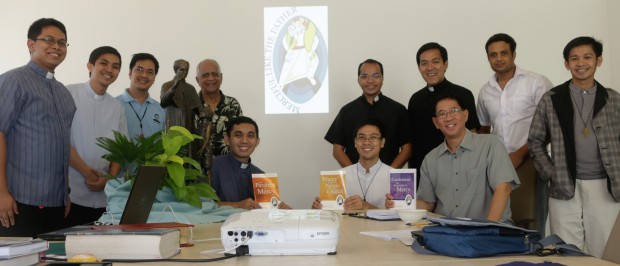
Paranaque City, the Philippines, November 19, 2015—The FIN students of Theology launched Talakayan, a monthly theological and pastoral forum at the Don Bosco Center of Studies. This initiative has been put up in order to better equip themselves for the pastoral ministry ahead. Though the forum is mainly for the FIN students of theology, it is open to all interested individuals.
Br. Juvelan Paul Samia, SDB presented his talk on the Systematic Reflections and Some Pastoral Guidelines on the Year of Mercy. His two reactors were Br. Ryan Oliver Bautista, SDB, himself a student of theology, and Fr. Cris Magbitang, SDB, Vice Dean on Student Affairs of DBCS.
The talk was not just theological, it also tackled the spiritual aspect of the jubilee.
Quoting Cardinal Walter Kasper’s work, Br. Juvelan emphasized that “The Church gives witness to divine mercy by (1) proclaiming the mercy of god, (2) by making the sacrament of reconciliation readily available, and (3) by allowing God’s mercy to appear and be realized in its concrete structures, its entire life, and even in its laws.”
His presentation also traced the teachings of the recent Holy Fathers on the subject of mercy–from Pope John XXIII down to Misericordiae Vultus, the Bull of Indiction heralding the Jubilee of Mercy, proclaimed just this year by Pope Francis.
Br. Juvelan culled some concrete suggestions from the Bull for the faithful on how to celebrate the jubilee:
- The practice of pilgrimage and entering the holy door (14)
- The practice of the corporal and spiritual works on mercy as a way to reawaken our conscience, too often grown dull in the face if poverty (15)
- Meditation on the passages of scriptures that deal with God’s mercy, especially during the season of lent (16)
- The celebration of the sacrament of reconciliation (17)
- Gain indulgence (22)
Reflecting on the literatures he perused on the Jubilee of Mercy, Br Juvelan is “convinced that only when, on a personal level, we become aware of our own need for god’s mercy, this jubilee of mercy, for which we are preparing for, will attain a special and very personal significance in our lives.”
The talk was held at the Benedict XVI Library, 3/F Seminar Room from 1:30-3:00 in the afternoon. Three talks are slated after yesterday’s symposium. To wit:
Dec 14 The World We Shall Leave Behind
Scientific, Philosophical and Spiritual Reflections on Laudato Si’
By Br. Ryan Oliver Bautista, SDB (Second Year, ITF)
Feb 8 Christ in You, Our Hope of Glory
Reflections on the International Eucharistic Congress 2016
By Br. Ramil Maranan, SDB (Third Year, ITF)
Mar 14 Emerging Theologies on the Family
The Long Journey from Gaudium et Spes to the 2015 Synod on the Family
By Br. Marc Will Lim, SDB (Third Year, ITF)









